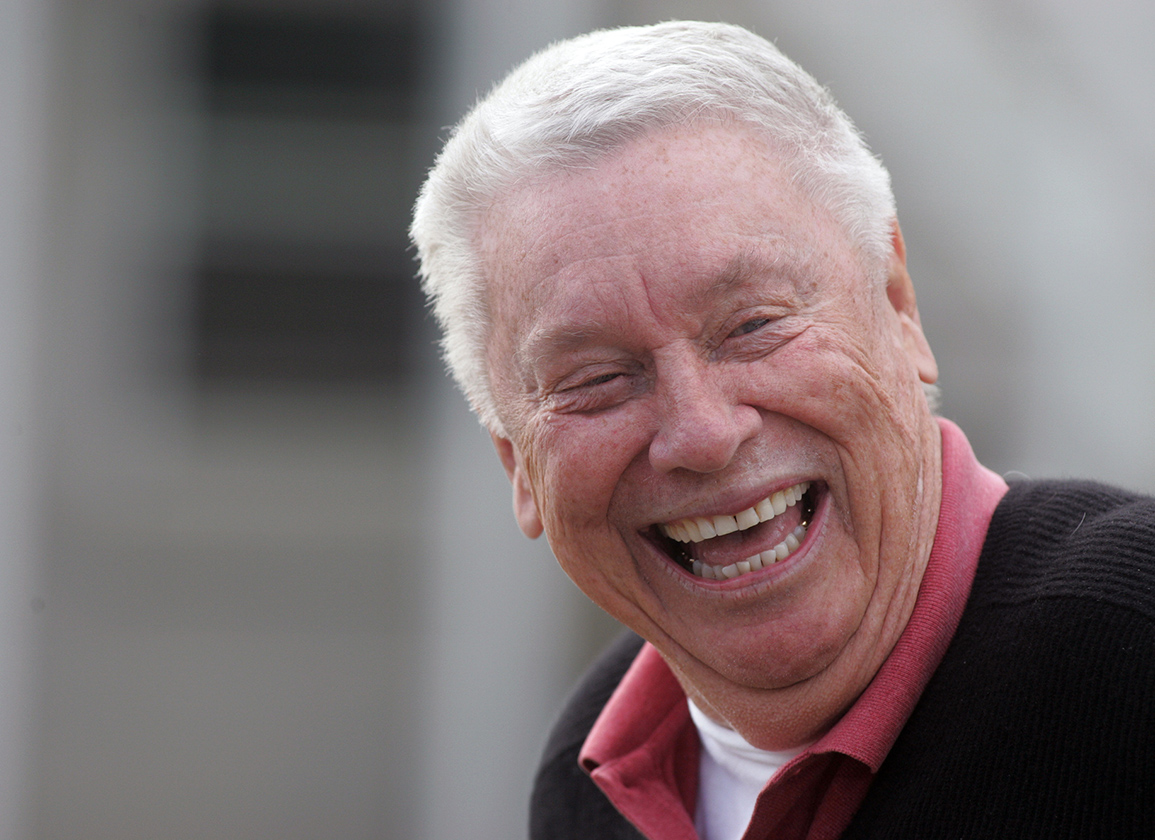By Chris McGrath
Nothing, it seems, will help you see through the vanity of materialism quite like a $4.1 billion fortune.
A few summers ago, I was sitting alone in the baronial boardroom at Spendthrift, waiting to interview the farm's owner. It was a hot day, but here all was panelled cool, the venerable furnishings slumbering through the prosperous drone of a lawnmower. I was thinking about this apt conflation of heritage and modernity when startled by the entry of a tanned octogenarian whose casual apparel, in the round, must have cost rather less than a typical pair of socks on Wall Street. B. Wayne Hughes apologized for running a little late, slouched into a chair, and gave the kind of smile you hope to see from the fellow who takes up his place next to you in the bleachers.
By the time we had finished, of course, I understood that even the immense riches that had funded the Spendthrift revival were nothing compared with the inner wealth of this extraordinary human being. Of course, he couldn't have accumulated one without the other–but nobody fortunate to have borrowed his insights for an hour or two would be so crass as to measure the man we lost on Wednesday merely by his worldly assets.
I should have known as much simply by reflecting on his choice of a humble cottage as his farm residence, turning over one of the most beautiful mansions in the Bluegrass to his team as an inspiring work environment.
Now if I had that kind of money…No, come on, what's the point of having an example like that right in front of you, if you still say that? When I have that kind of money, I must likewise see through the trappings; and remember that someday we will all be reduced, by our shared mortality, to the basic human equation: a finite existence that spans infinite possibilities of conduct, but only one ultimate outcome.
There's a consoling paradox to the fact that the B. Wayne Hughes respected and celebrated from the outside, including right here, will inevitably be a mere silhouette of the private figure loved and now grieved by friends and family.
These latter will be discovering little comfort in the reflection that Hughes was one of the greatest of all “winners” in the game of life. Their bereavement, on a human level, is no different from that endured by the rest of us, whatever our station, creed or color. (And nobody knew that better than Hughes himself, having lost an 8-year-old son to leukemia.)
But you know what? When their tears have dried, and they can take a step back, they should let the salutations of the public figure gradually seep into their reckonings. Because having duly lamented a cherished, complex parcel of flesh and blood, they will perhaps join the obituarists in recognizing the only immortality we know to be available: namely, the way a person uses such years as fall to his or her allocation.
In this case, the most obvious legacy could scarcely be more tangible. His philanthropic munificence will for years to come achieve concrete transformation in the odds facing those who feel they have “lost” the game of life. (And that aversion to personal aggrandizement, so evident in his wardrobe and mode of life, would prompt him to make many donations conditional on absolute anonymity.)
But Hughes leaves us parallel bequests that are barely less momentous. One, also destined to last for generations, will be registered in the genetic composition of the modern Thoroughbred. The other is one that might work for any or all of us, as individuals–and that is his example. The son of an Oklahoma sharecropper, whose family made the Grapes of Wrath migration from the Dust Bowl with a mattress strapped to the car roof, he sampled the full spectrum of human experience under capitalism.
The humility that made Hughes so insistent on his ordinariness is not, of course, the same as meekness. And his horror of pretension reflected a contempt for the kind of airs he saw in those who are either born to privilege, or devote their lives to its pursuit. Perhaps this helped to stimulate the revolution he instigated in Kentucky's commercial breeding industry, causing such fear and resentment among his establishment rivals. These complained that the kind of incentive schemes by which Hughes sustained an ever more industrial roster would make competition no longer viable. Most, however, ended up introducing equivalent programs on their own farms.
Hughes relished their discomfiture. “When you print all this crap that I'm saying, I'm probably going to be written up as a nut,” he said that morning, chuckling exultantly. “But I don't give a damn. What are they going to do to me? There's nothing they can do. That's what kills those guys.” He had been here before, after all, remembering the hostility of Californians to “Okies” who would work gratefully even for a subsistence wage.
And he had a prophecy: “If they want to stay in business, everybody will be doing what we're doing. And that includes everybody.” Because at some point one of these ugly-duckling stallions would turn into a swan.
It was beginning to happen already, at that time, the Share The Upside program having been devised to help a commercially moribund young stallion named Into Mischief. “You pay a bunch of money for a stallion, it's got the best chance,” Hughes said. “But his chances aren't 100%. And another guy's chance isn't zero. They're closer together. So we'll see.”
And see we did. The system produced its game-changer, and now Spendthrift has once again become a destination for Classic, two-turn stallions at the top end of the market, now including a Horse of the Year in Authentic.
Hughes cheerfully declared that he knew nothing about breeding; he could leave that to his experts. What he did understand was business, and human nature. And he knew that it was all about the base of the pyramid. That meant giving a shot to the little guys. They'd keep coming back and, the Thoroughbred being what it is, one of those seeds floating in the breeze would eventually sow a whole plantation of oaks.
His own journey, from victim of a historic crisis in capitalism to its summit, served as heartening template both for his roll-the-dice stallions and for the clients who used them. And who knows? Maybe his engagement with MyRacehorse, which gave him such pleasure in the success of Authentic, will yield a similar narrative. Maybe some blue-collar microshareholder will be the next to stake $25,000 with a buddy in a business that ends up valued at $40 billion.
Fitting, then, that the field assembling for the GI TVG Pacific Classic on Saturday should include Tizamagician (Tiznow). Perhaps the fates governing the Turf, for all their ruthless caprice, might even prove amenable to honoring Hughes with success for a horse representing MyRacehorse and Spendthrift Farm LLC. For he would ask no better parting shot than a reminder that our sport cannot survive as the preserve only of an opulent few; that it will only thrive if accessible and inclusive.
True, the Hughes system has also produced a legacy that makes some of us less comfortable. Doubtless he saw The Jockey Club's attempt to limit stallion books to 140 as the establishment circling its wagons, but the fact is that for every Into Mischief there will be dozens of failures–not just at Spendthrift, of course, but at other factory farms–whose hundreds of undeserved opportunities can only impair the breed.
Overall, however, our community is surely indebted to Hughes for a wholesome reproof against complacency. Ironic that he should have made his fortune in “self-storage.” Of the very few whose lives have followed such a giddy arc, fewer still have been so averse to flaunting “self.” And “storage” is such a conservative concept, suggestive of resources nervously withheld. What an embrace of life, in contrast, went into this epic tale!
By all accounts, Hughes remained to the end as restlessly full of ideas as he had been the morning of our meeting, when he had just made an offer for a stallion–an investment, as he noted, he couldn't begin to judge for at least four years.
So whatever the scoreboard of life tells us about our own state of play–whether we are still eking what we can from the dust, or can afford to send half a dozen mares to Authentic–we can all take something from this great American saga. For the Grapes of Wrath, at least in this instance, yielded a harvest of endeavor, generosity and imagination that we can profitably distill for many a year yet.
Not a subscriber? Click here to sign up for the daily PDF or alerts.






